To the Editors:
We are writing to express our grave concern about, and to protest, recent events in Kosovo. In July 1990 the Serbian government suspended Kosovo’s parliament and government and imposed direct rule through its own police force. Armed police occupied Albanian Radio and Television in the capital, Phrishtinë, and the building of the Albanian daily newpaper Rilindija. When Albanian journalists refused to work under such conditions—as they did—they were sacked. Policemen of Albanian origin who refused to sign agreement with the Serbian measures were demobilized. Leaders of the Albanian democratic opposition in Kosovo and delegates of the suspended parliament were taken in for questioning by the police and several were physically ill-treated. The Serbian vice-minister for internal affairs stated that some members of Kosovo’s suspended political institutions could face criminal prosecution.
These steps were only the latest in a long series of measures which the Serbian government has taken to remove the autonomy of the province of Kosovo. They were unconstitutional according to both the constitution of the Socialist Federative Republic of Yugoslavia and the constitution of the Socialist Republic of Serbia. They are without precedent in postwar European history. The use of repression has not solved any of the problems in Kosovo or in Serbia; it has only worsened the situation. The tragic result of this uncompromising and blind politics is a growing hostility between the ethnic communities living in the region and, according to reports from the region, the death of more than 100 Albanians. In addition, it appears that in the last nine years at least 500 Albanians have been wounded and some 10,000 imprisoned. Two hundred and forty Albanian leaders and intellectuals have been interned for various periods without trial and at least 600,000 Albanians have suffered at the hands of police (detentions, interrogations, beatings, etc.) The whole population of the province has been living in an undeclared state of emergency since 1981. A Serbian policeman was killed on a demonstration two years ago. That there have been no further deaths from political violence in the non-Albanian population is almost certainly due to the influence and authority of the Albanian democratic opposition and its principled commitment to nonviolence.
We understand the expressed concern for the rights of the Serbian minority in the region, but cannot see how these rights can ever be secured by the denial of the basic human rights and political liberties of the Albanian majority. On the contrary, only when those rights are fully respected can the rights of the Serbian minority, and of other minorities, be guaranteed. The root of the present problems in Kosovo is, namely, the resistance of the Serbian political authorities to the democratic reforms which have recently been implemented in other East European countries. The Serbian people are justifiably proud of their own struggles for liberty. We do not wish the repressive anti-Albanian politics of the Serbian state to isolate them or Yugoslavia from the democratic integration of Europe.
Finally, we are deeply concerned that, with the suspension of legal political institutions in Kosovo, the suppression of a free press, and the refusal of dialogue with the Albanian democratic opposition (which, although illegal, enjoys the support of the great majority of the population) there are no means left for a political, that is nonviolent, resolution of the crisis. This has created a real and immediate risk of civil war. Quite apart from the horror of such an event for Yugoslavia itself, war in the Balkans has not previously remained a local event and on this occasion could endanger detente and the democratic processes underway throughout Europe.
We urge the Federal Government to respect its own constitution; to insist on the immediate reinstitution of the Kosovo parliament; and to ensure that basic human rights and political liberties exist in every part of Yugoslavia. We also call for the legalization of the democratic opposition in Kosovo and for dialogue between all political forces in the province. If the Albanian majority in Kosovo does not have the right to choose its political representatives freely, and to decide how it would like to live in Yugoslavia, there cannot be peace and democracy in either Yugoslavia or Europe.
BRITAIN
Neal Ascherson, Journalist
Anthony Barnett, Charter 88
Ken Coates, Member of European Parliament
Timothy Garton Ash, Writer
Dr. Lynne Jones; Mary Kaldor, European Dialogue
Professor John Keane, Polytechnic of Central London
Professor Steven Lukes, European University Institute, Florence
Hilary Wainwright, Manchester University
USA
Virginia Baron, Richard Deats, Fellowship of Reconciliation
Andrea Imredy, Joanne Landy, Campaign for Peace and Democracy
Julian and Phyllis Jacobson, New Politics
Roy Morrison, Clamshell Alliance
OTHER COUNTRIES
Dr. Irmtraut Karlsson, Member of Parliament, Austria
Professor Bohdan Krawchenko, University of Alberta, Canada
Myrna Kostash, Writers’ Union of Canada
Ruth Sormova, Independent Peace Association. Czech and Slovak Federative Republic
Toni Liversage, Danish Writers’ Union
Jean Chesneaux, Historian, France
Solange Fernex, Member of European Parliament, France
Gilles Perrault, Writer, France
Birgit Voigt, Green Party, Germany
Radha Kumar, Movement Against Communalism, India
and more than one hundred other signatories in fourteen countries
This Issue
April 11, 1991



